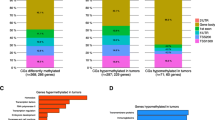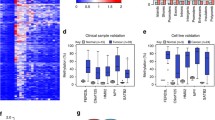Abstract
Aberrant DNA methylation of regulatory sequences is a well-documented mechanism of functional deletion of genes with anti-tumourigenic properties including microRNAs. This review discusses the publications describing aberrant methylation of microRNA genes in human breast cancer cells. Among the anti-tumourigenic properties of epigenetically inactivated microRNA genes, the inhibition of proliferation and of epithelial-to-mesenchymal transition (EMT) are the best studied. Several studies are conceptually very interesting and present a comprehensive functional characterization of anti-tumorigenic microRNAs. The link between microRNA expression and gene methylation is not addressed directly by all studies and a number of studies are limited in their strength by not including primary breast cancer specimens or by analysing very small sets of primary human specimens. The publications cover a wide range of DNA methylation detection techniques, often making direct comparison of results challenging. Despite the identification and thorough characterization of many interesting candidates and functionally important microRNA genes affected by DNA methylation, the translation of microRNA gene methylation as a new biomarker into the daily routine practice has not yet worked out.


Similar content being viewed by others
Abbreviations
- EMT:
-
Epithelial-to-mesenchymal transition
- HMEC:
-
Human mammary epithelial cells
- HMF:
-
Human mammary fibroblasts
- MSC:
-
Mesenchymal stem cells
- MSP:
-
Methylation-specific PCR
References
Bediaga NG, Acha-Sagredo A, Guerra I, Viguri A, Albaina C, Ruiz Diaz I, Rezola R, Alberdi MJ, Dopazo J, Montaner D, Renobales M, Fernandez AF, Field JK, Fraga MF, Liloglou T, de Pancorbo MM (2010) DNA methylation epigenotypes in breast cancer molecular subtypes. Breast Cancer Res 12:R77
Berger SL, Kouzarides T, Shiekhattar R, Shilatifard A (2009) An operational definition of epigenetics. Genes Dev 23:781–783
Bertos NR, Park M (2011) Breast cancer – one term, many entities? J Clin Oncol 121:3789–3796
Bhattacharyya S, Yu Y, Suzuki M, Campbell N, Mazdo J, Vasanthakumar A, Bhagat TD, Nischal S, Christopeit M, Parekh S, Steidl U, Godley L, Maitra A, Greally JM, Verma A (2013) Genome-wide hydroxymethylation tested using the HELP-GT assay shows redistribution in cancer. Nucleic Acids Res 41:e157
Biagioni F, Bossel Ben-Moshe N, Fontemaggi G, Canu V, Mori F, Antoniani B, Di Benedetto A, Santoro R, Germoni S, De Angelis F, Cambria A, Avraham R, Grasso G, Strano S, Muti P, Mottolese M, Yarden Y, Domany E, Blandino G (2012) miR-10b*, a master inhibitor of the cell cycle, is down-regulated in human breast tumours. EMBO Mol Med 4:1214–1229
Bird A (2007) Perceptions of epigenetics. Nature 447:396–398
Castilla MA, Diaz-Martin J, Sarrio D, Romero-Perez L, Lopez-Garcia MA, Vieites B, Biscuola M, Ramiro-Fuentes S, Isacke CM, Palacios J (2012) MicroRNA-200 family modulation in distinct breast cancer phenotypes. PLoS ONE 7:e47709
Day TK, Bianco-Miotto T (2013) Common gene pathways and families altered by DNA methylation in breast and prostate cancers. Endocr Relat Cancer 20:R215–232
de Souza Rocha Simonini P, Breiling A, Gupta N, Malekpour M, Youns M, Omranipour R, Malekpour F, Volinia S, Croce CM, Najmabadi H, Diederichs S, Sahin O, Mayer D, Lyko F, Hoheisel JD, Riazalhosseini Y (2010) Epigenetically deregulated microRNA-375 is involved in a positive feedback loop with estrogen receptor alpha in breast cancer cells. Cancer Res 70:9175–9184
Feinberg AP, Tycko B (2004) The history of cancer epigenetics. Nat Rev Cancer 4:143–153
Foulkes WD, Smith IE, Reis-Filho JS (2010) Triple-Negative Breast Cancer. N Engl J Med 363:1938–1948
Griesemer J (2002) What is “epi” about epigenetics? Ann NY Acad Sci 981:97–110
Guedj M, Marisa L, de Reynies A, Orsetti B, Schiappa R, Bibeau F, MacGrogan G, Lerebours F, Finetti P, Longy M, Bertheau P, Bertrand F, Bonnet F, Martin AL, Feugeas JP, Biéche I, Lehmann-Che J, Lideareau R, Brindbaum D, Bertucci F, de Thé H, Theillet C (2012) A refined molecular taxonomy of breast cancer. Oncogene 31:1196–1206
Haga CL, Phinney DG (2012) MicroRNAs in the imprinted DLK1-DIO3 region repress the epithelial-to-mesenchymal transition by targeting the TWIST1 protein signaling network. J Biol Chem 287:42695–42707
Haig D (2004) The (dual) origin of epigenetics. Cold Spring Harb Symp Quant Biol 69:67–70
Holliday R (2006) Epigenetics: a historical overview. Epigenetics 1:76–80
Hsu PY, Deatherage DE, Rodriguez BA, Liyanarachchi S, Weng YI, Zuo T, Liu J, Cheng AS, Huang TH (2009) Xenoestrogen-induced epigenetic repression of microRNA-9-3 in breast epithelial cells. Cancer Res 69:5936–5945
Hu H, Li S, Cui X, Lv X, Jiao Y, Yu F, Yao H, Song E, Chen Y, Wang M, Lin L (2013) The overexpression of hypomethylated miR-663 induces chemotherapy resistance in human breast cancer cells by targeting heparin sulfate proteoglycan 2 (HSPG2). J Biol Chem 288:10973–10985
Huang Y, Pastor WA, Shen Y, Tahiliani M, Liu DR, Rao A (2010) The behaviour of 5-hydroxymethylcytosine in bisulfite sequencing. PLoS ONE 5:e8888
Javeri A, Ghaffarpour M, Taha MF, Houshmand M (2013) Downregulation of miR-34a in breast tumors is not associated with either p53 mutations or promoter hypermethylation while it correlates with metastasis. Med Oncol 30:413
Jin SG, Kadam S, Pfeifer GP (2010) Examination of the specificity of DNA methylation profiling techniques towards 5-methylcytosine and 5-hydroxymethylcytosine. Nucleic Acids Res 38:e125
Lehmann U, Hasemeier B, Christgen M, Muller M, Romermann D, Langer F, Kreipe H (2008) Epigenetic inactivation of microRNA gene hsa-mir-9-1 in human breast cancer. J Pathol 214:17–24
Li CI, Uribe DJ, Daling JR (2005) Clinical characteristics of different histological types of breast cancer. Br J Cancer 93:1046–1052
Li D, Zhao Y, Liu C, Chen X, Qi Y, Jiang Y, Zou C, Zhang X, Liu S, Wang X, Zhao D, Sun Q, Zeng Z, Dress A, Lin MC, Kung HF, Rui H, Liu LZ, Mao F, Jiang BH, Lai L (2011) Analysis of MiR-195 and MiR-497 expression, regulation and role in breast cancer. Clin Can Res 17:1722–1730
Lodygin D, Tarasov V, Epanchintsev A, Berking C, Knyazeva T, Korner H, Knyazev P, Diebold J, Hermeking H (2008) Inactivation of miR-34a by aberrant CpG methylation in multiple types of cancer. Cell Cycle 7:2591–2600
Lopez-Serra P, Esteller M (2012) DNA methylation-associated silencing of tumor-suppressor microRNAs in cancer. Oncogene 31:1609–1622
Lu L, Katsaros D, Zhu Y, Hoffman A, Luca S, Marion CE, Mu L, Risch H, Yu H (2011) Let-7a regulation of insulin-like growth factors in breast cancer. Breast Cancer Res Treat 126:687–694
Morita S, Takahashi RU, Yamashita R, Toyoda A, Horii T, Kimura M, Fujiyama A, Nakai K, Tajima S, Matoba R, Ochiya T, Hatada I (2012) Genome-Wide Analysis of DNA Methylation and Expression of MicroRNAs in Breast Cancer Cells. Int J Mol Sci 13:8259–8272
Nestor C, Ruzov A, Meehan R, Dunican D (2010) Enzymatic approaches and bisulfite sequencing cannot distinguish between 5-methylcytosine and 5-hydroxymethylcytosine in DNA. Biotechniques 48:317–319
Network TCGA (2012) Comprehensive molecular portraits of human breast tumours. Nature 490:61–70
Pfeifer GP, Kadam S, Jin SG (2013) 5-hydroxymethylcytosine and its potential roles in development and cancer. Epigenetics Chromatin 6:10
Png KJ, Yoshida M, Zhang XH, Shu W, Lee H, Rimner A, Chan TA, Comen E, Andrade VP, Kim SW, King TA, Hudis CA, Norton L, Hicks J, Massague J, Tavazoie SF (2011) MicroRNA-335 inhibits tumor reinitiation and is silenced through genetic and epigenetic mechanisms in human breast cancer. Genes Dev 25:226–231
Ptashne M (2007) On the use of the word ‘epigenetic’. Curr Biol 17:R233–236
Ptashne M (2013a) Epigenetics: core misconcept. Proc Natl Acad Sci USA 110:7101–7103
Ptashne M (2013b) Faddish stuff: epigenetics and the inheritance of acquired characteristics. FASEB J 27:1–2
Radpour R, Barekati Z, Kohler C, Schumacher MM, Grussenmeyer T, Jenoe P, Hartmann N, Moes S, Letzkus M, Bitzer J, Lefkovits I, Staedtler F, Zhong XY (2011) Integrated epigenetics of human breast cancer: synoptic investigation of targeted genes, microRNAs and proteins upon demethylation treatment. PLoS ONE 6:e27355
Samantarrai D, Dash S, Chhetri B, Mallick B (2013) Genomic and epigenomic cross-talks in the regulatory landscape of miRNAs in breast cancer. Mol Cancer Res 11:315–328
Sotiriou C, Pusztai L (2009) Gene-Expression Signatures in Breast Cancer. N Engl J Med 360:790–800
Soto-Reyes E, Gonzalez-Barrios R, Cisneros-Soberanis F, Herrera-Goepfert R, Perez V, Cantu D, Prada D, Castro C, Recillas-Targa F, Herrera LA (2012) Disruption of CTCF at the miR-125b1 locus in gynecological cancers. BMC Cancer 12:40
Stefansson OA, Esteller M (2013) Epigenetic modifications in breast cancer and their role in personalized medicine. Am J Pathol 183:1052–1063
Suzuki H, Maruyama R, Yamamoto E, Kai M (2012) DNA methylation and microRNA dysregulation in cancer. Mol Oncol 6:567–578
Tan L, Shi YG (2012) Tet family proteins and 5-hydroxymethylcytosine in development and disease. Development 139:1895–1902
Tavazoie SF, Alarcon C, Oskarsson T, Padua D, Wang Q, Bos PD, Gerald WL, Massague J (2008) Endogenous human microRNAs that suppress breast cancer metastasis. Nature 451:147–152
Vogt M, Munding J, Gruner M, Liffers ST, Verdoodt B, Hauk J, Steinstraesser L, Tannapfel A, Hermeking H (2011) Frequent concomitant inactivation of miR-34a and miR-34b/c by CpG methylation in colorectal, pancreatic, mammary, ovarian, urothelial, and renal cell carcinomas and soft tissue sarcomas. Virchows Arch 458:313–322
Vrba L, Munoz-Rodriguez JL, Stampfer MR, Futscher BW (2013) miRNA gene promoters are frequent targets of aberrant DNA methylation in human breast cancer. PLoS ONE 8:e54398
Wee EJ, Peters K, Nair SS, Hulf T, Stein S, Wagner S, Bailey P, Lee SY, Qu WJ, Brewster B, French JD, Dobrovic A, Francis GD, Clark SJ, Brown MA (2012) Mapping the regulatory sequences controlling 93 breast cancer-associated miRNA genes leads to the identification of two functional promoters of the Hsa-mir-200b cluster, methylation of which is associated with metastasis or hormone receptor status in advanced breast cancer. Oncogene 31:4182–4195
Weigelt B, Baehner FL, Reis-Filho JS (2010) The contribution of gene expression profiling to breast cancer classification, prognostication and prediction: a retrospective of the last decade. J Pathol 220:263–280
Winter J, Jung S, Keller S, Diederichs S (2009) Many roads to maturity: microRNA biogenesis pathways and their regulation. Nature Cell Biol 11:228–234
Xhemalce B, Robson SC, Kouzarides T (2012) Human RNA methyltransferase BCDIN3D regulates microRNA processing. Cell 151:278–288
Xiong Z, Laird PW (1997) COBRA: a sensitive and quantitative DNA methylation assay. Nucleic Acids Res 25:2532–2534
Xu Q, Jiang Y, Yin Y, Li Q, He J, Jing Y, Qi YT, Li W, Lu B, Peiper SS, Jiang BH, Liu LZ (2013) A regulatory circuit of miR-148a/152 and DNMT1 in modulating cell transformation and tumor angiogenesis through IGF-IR and IRS1. J Mol Cell Biol 5:3–13
Zhang Y, Yan LX, Wu QN, Du ZM, Chen J, Liao DZ, Huang MY, Hou JH, Wu QL, Zeng MS, Huang WL, Zeng YX, Shao JY (2011) miR-125b is methylated and functions as a tumor suppressor by regulating the ETS1 proto-oncogene in human invasive breast cancer. Cancer Res 71:3552–3562
Zhang Y, Yang P, Sun T, Li D, Xu X, Rui Y, Li C, Chong M, Ibrahim T, Mercatali L, Amadori D, Lu X, Xie D, Li QJ, Wang XF (2013) miR-126 and miR-126* repress recruitment of mesenchymal stem cells and inflammatory monocytes to inhibit breast cancer metastasis. Nature Cell Biol 15:284–294
Acknowledgment
The author would like to thank, as always, Britta Hasemeier for indispensable help with Fig. 1.
Author information
Authors and Affiliations
Corresponding author
Electronic supplementary material
Below is the link to the electronic supplementary material.
ESM 1
(DOC 29 kb)
Rights and permissions
About this article
Cite this article
Lehmann, U. Aberrant DNA methylation of microRNA genes in human breast cancer – a critical appraisal. Cell Tissue Res 356, 657–664 (2014). https://doi.org/10.1007/s00441-014-1793-0
Received:
Accepted:
Published:
Issue Date:
DOI: https://doi.org/10.1007/s00441-014-1793-0




